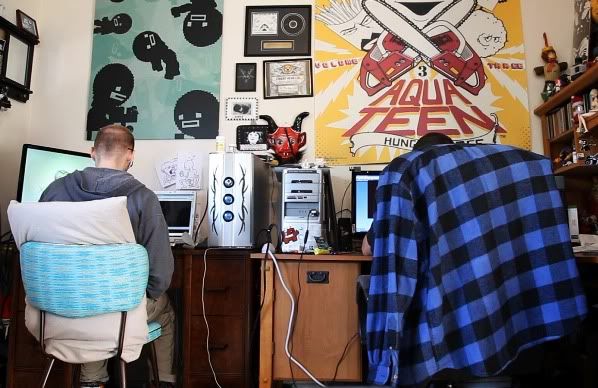This post has not been edited by the GamesBeat staff. Opinions by GamesBeat community writers do not necessarily reflect those of the staff.

Note: BlinkWorks Media sent me a copy of Indie Game: The Movie for this article.
As a gamer invested in the success of the medium, I feel a compulsory obligation to support indie gaming; failure to do so entails support for big corporations, Modern Warfare, and everything allegedly wrong with the industry. But to paraphrase Penny Arcade co-founder Jerry "Tycho” Holkins, I don’t do compulsory, and I’d rally behind a more elegant banner than anti-corporatism. Indie Game: The Movie provides that standard.
Canadian filmmakers James Swirsky and Lisanne Pajot remind us that real people make video games — genuine artists baring their soul upon a digital canvass, creating something intensely personal. In many cases, these auteurs invest their entire livelihoods, subverting any and all personal relationships.
Indie Game: The Movie isn’t an affirmation of indie games as much as it is a celebration of the artists who make them. Edmund McMillen (Super Meat Boy), Tommy Refenes (SMB), and Phil Fish (Fez) aren’t soulless automatons, and they certainly aren’t immune to criticism.
 So when irate fans take to the message boards to express their displeasure (a nice way of saying "froth at the mouth") over Fez’s long incubation period, minor bugs, or frame rates, their kvetching reaches the eyes and ears of real people.
So when irate fans take to the message boards to express their displeasure (a nice way of saying "froth at the mouth") over Fez’s long incubation period, minor bugs, or frame rates, their kvetching reaches the eyes and ears of real people.
These people are nothing if not tenacious, and they seek avenues of expression through our beloved digital medium. Phil Fish declares gaming the "ultimate art form," while Edmund McMillen feels that a video game is about “expressing myself.” Each developer assures us that they make games for themselves first and foremost — each line of code imparts something highly personal.
For Edmund, Aether reflects his own childhood feelings of abandonment and alienation, issues which persist — “I desperately want to communicate with people, but I don’t want the messy interaction of having to make friends and talk to people, because I probably don’t like them.”
Raise your hand if you can relate.
 Phil Fish contemplates suicide during Fez’s laborious development process and the specter of a nasty lawsuit which hangs over his head like the Sword of Damocles.
Phil Fish contemplates suicide during Fez’s laborious development process and the specter of a nasty lawsuit which hangs over his head like the Sword of Damocles.
Even with the benefit of hindsight, you desperately want these people to succeed. But Indie Game: The Movie is more than just an underdog story…it’s an intimate look at the human side of game development.
The documentary focuses on the tumultuous development periods of both Super Meat Boy and Fez, while Jonathan Blow reflects back on Braid and all it meant to him. The personal stories inform the emotional core of Indie Game: The Movie.
Phil Fish endures a nasty “breakup” with his former business partner which affects the legal status of Fez. At one point, the Canadian developer finds himself at PAX East with the implicit knowledge that demoing Fez publicly could land him in court. Meanwhile, an online “army of assholes” continually snipe at him over the game’s long development process. (Upon reflection, Fish admits that Fez was “ridiculously overambitious.”)
To compound matters, the early public demos include numerous game-breaking bugs. And though Fez has since attained great critical and commercial acclaim, its status remains unknown as the credits roll. (The film's Special Edition will include a "Phil Fish Epilogue.")

Phil Fish enjoys an adult beverage at PAX East 2011.
It’s clear that these indie developers aren’t supermen, and you become heavily invested in their stories. Filmmakers James Swirsky and Lisanne Pajot show a remarkable degree of restraint in documenting their subjects’ struggles; you witness tender moments, but the enterprise never feels exploitative.
And by the end, you’ve beheld something very real and very raw. Indie Game: The Movie shows a neglected part of game development — the human side.
